Related Research Articles
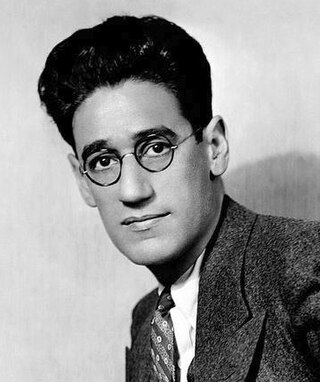
George Simon Kaufman was an American playwright, theater director and producer, humorist, and drama critic. In addition to comedies and political satire, he wrote several musicals for the Marx Brothers and others. He won the Pulitzer Prize for Drama for the musical Of Thee I Sing in 1932, and won again in 1937 for the play You Can't Take It with You. He also won the Tony Award for Best Director in 1951 for the musical Guys and Dolls.
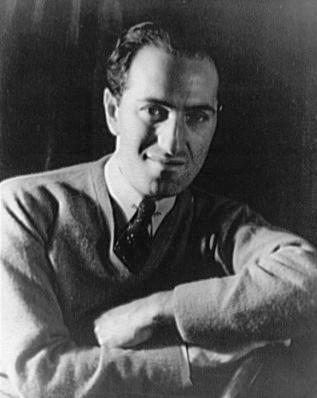
George Gershwin was an American composer and pianist whose compositions spanned popular, jazz and classical genres. Among his best-known works are the orchestral compositions Rhapsody in Blue (1924) and An American in Paris (1928), the songs "Swanee" (1919) and "Fascinating Rhythm" (1924), the jazz standards "Embraceable You" (1928) and "I Got Rhythm" (1930), and the opera Porgy and Bess (1935), which included the hit "Summertime".

Ira Gershwin was an American lyricist who collaborated with his younger brother, composer George Gershwin, to create some of the most memorable songs in the English language of the 20th century. With George, he wrote more than a dozen Broadway shows, featuring songs such as "I Got Rhythm", "Embraceable You", "The Man I Love" and "Someone to Watch Over Me". He was also responsible, along with DuBose Heyward, for the libretto to George's opera Porgy and Bess.

Ethel Merman was an American actress and singer. Known for her distinctive, powerful voice, as well as her leading roles in musical theater, she has been called "the undisputed First Lady of the musical comedy stage." She performed on Broadway in Anything Goes, Annie Get Your Gun, Gypsy, and Hello, Dolly!

Oscar Levant was an American concert pianist, composer, conductor, author, radio game show panelist, television talk show host, comedian, and actor. He was known for his performances in the films Rhapsody in Blue (1945), The Barkleys of Broadway (1949), An American in Paris (1951), and The Band Wagon (1953). He was awarded a star on the Hollywood Walk of Fame in 1960 for recordings featuring his piano performances. He was equally famous for his mordant character and witticisms, on the radio and later in movies and television, as for his music. He was portrayed by Sean Hayes in the Broadway play Good Night, Oscar written by Doug Wright.

Robert Russell Bennett was an American composer and arranger, best known for his orchestration of many well-known Broadway and Hollywood musicals by other composers such as Irving Berlin, George Gershwin, Jerome Kern, Cole Porter, and Richard Rodgers.
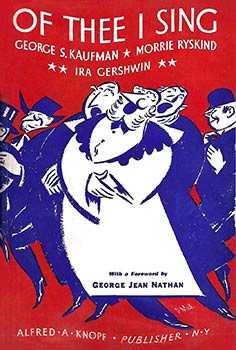
Of Thee I Sing is a musical with a score by George Gershwin, lyrics by Ira Gershwin and a book by George S. Kaufman and Morrie Ryskind. The musical lampoons American politics; the story concerns John P. Wintergreen, who runs for President of the United States on the "love" platform. When he falls in love with the sensible Mary Turner instead of Diana Devereaux, the beautiful pageant winner selected for him, he gets into political hot water.
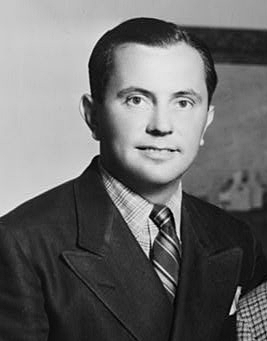
Vernon Duke was a Russian-born American composer/songwriter who also wrote under his birth name, Vladimir Dukelsky. He is best known for "Taking a Chance on Love," with lyrics by Ted Fetter and John Latouche (1940), "I Can't Get Started," with lyrics by Ira Gershwin (1936), "April in Paris," with lyrics by E. Y. ("Yip") Harburg (1932), and "What Is There To Say," for the Ziegfeld Follies of 1934, also with Harburg. He wrote the words and music for "Autumn in New York" (1934) for the revue Thumbs Up! In his book, American Popular Song, The Great Innovators 1900-1950, composer Alec Wilder praises this song, writing, “The verse may be the most ambitious I’ve ever seen." Duke also collaborated with lyricists Johnny Mercer, Ogden Nash, and Sammy Cahn.

The Neil Simon Theatre, originally the Alvin Theatre, is a Broadway theater at 250 West 52nd Street in the Theater District of Midtown Manhattan in New York City. Opened in 1927, the theater was designed by Herbert J. Krapp and was built for Alex A. Aarons and Vinton Freedley. The original name was an amalgamation of Aarons's and Freedley's first names; the theater was renamed for playwright Neil Simon in 1983. The Neil Simon has 1,467 seats across two levels and is operated by the Nederlander Organization. Both the facade and the auditorium interior are New York City landmarks.

The Al Hirschfeld Theatre, originally the Martin Beck Theatre, is a Broadway theater at 302 West 45th Street in the Theater District of Midtown Manhattan in New York City. Opened in 1924, it was designed by G. Albert Lansburgh in a Moorish and Byzantine style and was constructed for vaudevillian Martin Beck. It has 1,404 seats across two levels and is operated by Jujamcyn Theaters. Both the facade and the interior are New York City landmarks.

The Shubert Theatre is a Broadway theater at 225 West 44th Street in the Theater District of Midtown Manhattan in New York City. Opened in 1913, the theater was designed by Henry Beaumont Herts in the Italian Renaissance style and was built for the Shubert brothers. Lee and J. J. Shubert had named the theater in memory of their brother Sam S. Shubert, who died in an accident several years before the theater's opening. It has 1,502 seats across three levels and is operated by The Shubert Organization. The facade and interior are New York City landmarks.
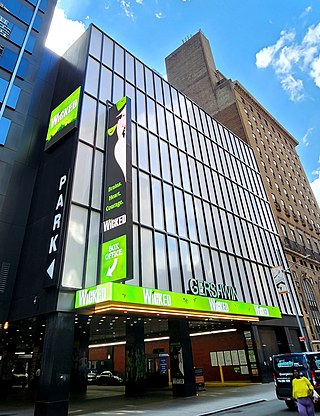
The Gershwin Theatre is a Broadway theater at 222 West 51st Street, on the second floor of the Paramount Plaza office building, in the Midtown Manhattan neighborhood of New York City. Opened in 1972, it is operated by the Nederlander Organization and is named after brothers George and Ira Gershwin, who wrote several Broadway musicals. The Gershwin is Broadway's largest theater, with approximately 1,933 seats across two levels. Over the years, it has hosted musicals, dance companies, and concerts.

The World of Henry Orient is a 1964 American comedy film directed by George Roy Hill and starring Peter Sellers, Paula Prentiss, Angela Lansbury, Tippy Walker, Merrie Spaeth, Phyllis Thaxter, Bibi Osterwald and Tom Bosley. It is based on the novel of the same name by Nora Johnson, who co-wrote the screenplay with her father, Nunnally Johnson.

The Booth Theatre is a Broadway theater at 222 West 45th Street in the Theater District of Midtown Manhattan in New York City. Opened in 1913, the theater was designed by Henry Beaumont Herts in the Italian Renaissance style and was built for the Shubert brothers. The venue was originally operated by Winthrop Ames, who named it for 19th-century American actor Edwin Booth. It has 800 seats across two levels and is operated by The Shubert Organization. The facade and parts of the interior are New York City landmarks.

The Cocoanuts is a musical with music and lyrics by Irving Berlin and a book by George S. Kaufman, with additional text by Morrie Ryskind.
Leonora Corbett was an English actress, noted for her charm and elegance in stage roles, and for a number of films made in the 1930s.

Frederick A. Thompson, usually credited as Fred Thompson was an English writer, best known as a librettist for about fifty British and American musical comedies in the first half of the 20th century. Among the writers with whom he collaborated were George Grossmith Jr., P. G. Wodehouse, Guy Bolton and Ira Gershwin. Composers with whom he worked included Lionel Monckton, Ivor Novello and George Gershwin.

Two Little Girls in Blue is a musical theatre work composed by Paul Lannin and Vincent Youmans, with lyrics by Ira Gershwin and a libretto by Fred Jackson. The musical premiered at George M. Cohan's Theatre on Broadway on May 3, 1921.
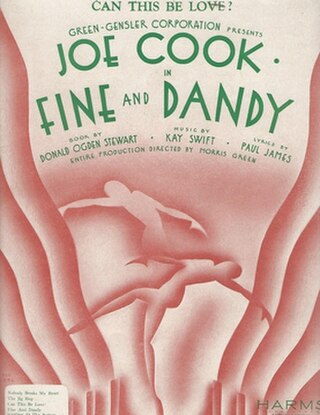
Fine and Dandy is a musical comedy in two acts with a book by Donald Ogden Stewart, music by Kay Swift and lyrics by Paul James. It was produced on Broadway in 1930.
References
- Furia, Philip. Ira Gershwin (1997), Oxford University Press US, ISBN 0-19-511570-8, p. 201